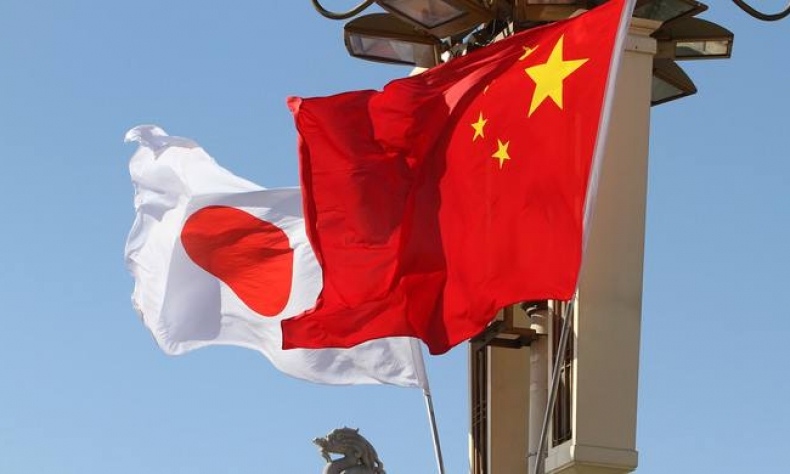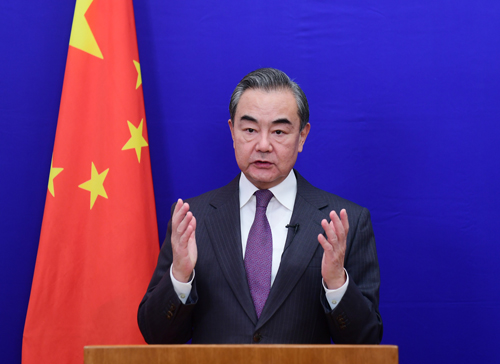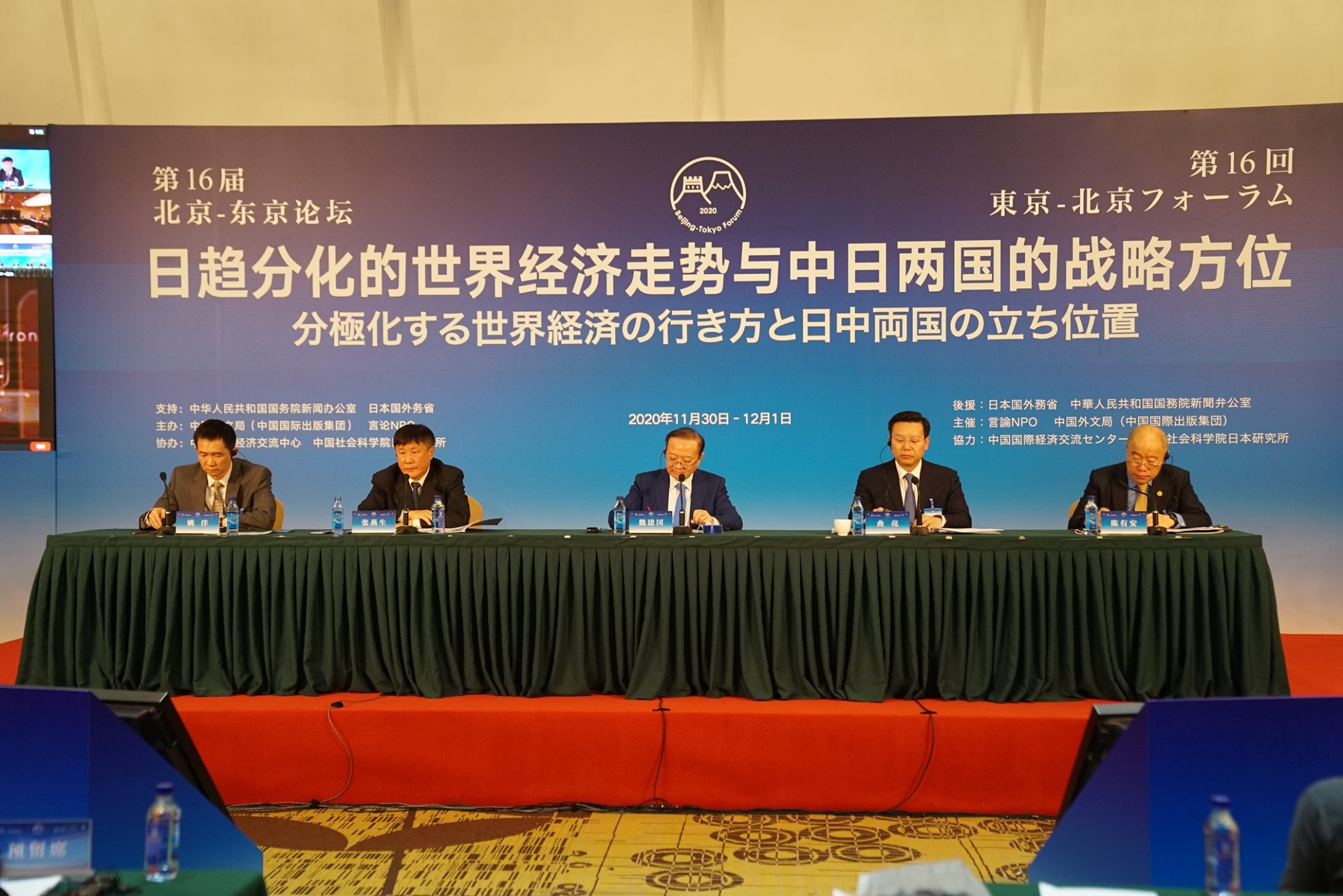
Beijing-Tokyo Forum: Sino-Japan Relations to Strengthen in Post-Pandemic Era
China and Japan can further strengthen communication and coordination on regional cooperation in the Asia-Pacific, and work together for regional prosperity and revitalization.
Digital technology is increasingly playing a greater role since the COVID19 outbreak. For the 16th Beijing-Tokyo Forum, held via video conference for the first-time last week, digital technology proved to be instrumental.
The Forum brought together experts, government officials and private sector representatives from China and Japan to discuss key issues and enhance post-pandemic bilateral cooperation.
As an annual Sino-Japan public diplomacy event, the 16th Beijing-Tokyo Forum is jointly hosted by China International Publishing Group (CIPG) and the Genron NPO. It is the highest public diplomatic communication platform between China and Japan, with this year’s theme highlighting “the international order in the post-pandemic era and the role that China and Japan should play”.
The two-day event set up six parallel online sub-forums, covering fields of public health, bilateral politics and diplomacy, economy and trade, media, digital economy and security.
New Japanese cabinet promises greater bilateral cooperation
During the opening ceremony, Chinese State Councilor and Foreign Minister Wang Yi delivered a speech via video-link.
After extending a warm welcome to the people of Japan, Wang said that friendship has always been an important cornerstone for the development of Sino-Japanese relations. There are both broad common interests and some differences between China and Japan, which need to be properly handled, he said.
The highlight of the event was when Japanese Prime Minister Yoshihide Suga and Chinese State Councilor and Foreign Minister Wang Yi agreed to enhance bilateral relations. Suga said the new Japanese Cabinet attaches great importance to Japan-China relations and is willing to work with China to enhance mutual trust and jointly push for a steady development of bilateral relations.
Former Japanese Prime Minister Yasuo Fukuda, also gave a speech at the forum, he said: “We should find a way to avoid the Thucydides Trap by preventing the China-US confrontation from deepening further.”
“Only through direct communication and personal experience of each other’s countries can mutual understanding and trust be generated between the two peoples. Japan and China need to conduct more extensive cultural and people-to-people exchanges,” he added.
Fukuda said that because the two countries are both of great influence, it is of utmost significance to the regional and the international community that the two countries develop stable relations and deepen exchanges and cooperation.
Before the forum began, Wang Yi met with former Japanese Prime Minister Yasuo Fukuda. During his visit, Wang said China and Japan can further strengthen communication and coordination on regional cooperation in the Asia-Pacific, and work together for regional prosperity and revitalization. China encouraged Japan to seize new opportunities and share in more of the benefits of China’s rapid development.

COVID-19 pandemic highlights need for cooperation
Although the pandemic delivered a big hit on some industries, it has also brought growth to other areas – particularly in the digital technology field.
Wei Jianguo, former vice minister of Commerce and vice president of the China Center for International Economic Exchanges gave a keynote speech at a side-event on economic cooperation and trade. Wei said now is the best time for to increase cooperation between China and Japan.
Given the current situation — especially the economic situation — he said, the center of the world economy will shift to Asia faster than anyone expected. China and Japan should take advantages of such opportunities to improve the production chain, supply chain and value chain, he added.
Japanese business leaders welcomed the signing of the Regional Comprehensive Economic Partnership (RCEP) agreement, expecting it to boost trade and investment in the Asia-Pacific region.
According to Japanese local media, the mega trade deal among 15 Asia-Pacific countries, covering about 46 percent of Japan’s total trade, will be the country’s first trade deal with both China, its largest trading partner, and South Korea, its third largest.
Former Chinese Ambassador to Japan Cheng Yonghua, cited three changes likely to reshape the current global order.
The first change is the change of power, said Cheng. The shift of the world economic center from west to east is accelerating. The second is the change of pattern. Emerging economies and developing countries are increasingly calling for a more just and equitable international order and global governance mechanism. At the same time, unilateralism and protectionism are undermining the international political and economic order.
The third change is the change of social productive forces, he said. The 4th industrial revolution is underway, and Artificial Intelligence and the digital economy are booming. The world economy is at a critical juncture, where the old drivers of growth are replaced by the new ones.
Cheng added that China and Japan are the two largest economies in Asia. The two sides should take a responsible attitude towards the future and destiny of the Asian people and promote Asia’s unity and rejuvenation, steering the Asian economy away from the epidemic and back towards growth.

Digital economy cooperation
A report from the Chinese Academy of Cyberspace Studies was unveiled at the World Internet Conference — Internet Development Forum, last month. The report said the COVID-19 pandemic had underscored the importance of the Internet, while the digital economy has become an important force in mitigating the impact of the virus, reshaping the economy and improving governance capability.
China’s digital economy reached 35.8 trillion yuan ($5.45 trillion) in 2019, accounting for 36.2 percent of China’s total GDP, according to the report.
Senior executives from Huawei, Alibaba, Tencent and iFlytek were in attendance at this year’s sub-forum on digital economy – highlighting the key role of the tech sector in the post-pandemic world.
Xu Zhiyu, president of global government affairs of Huawei Technologies expressed his opinion on potential avenues of cooperation for Chinese and Japanese enterprises to work together.
The cooperation between Chinese and Japanese companies can create a common digital future, Xu said. Both China and Japan have industrial advantages and prioritize innovation.
Huawei respects digital sovereignty, Xu said, adding that the potential of the digital economy is huge, though many challenges remain. Huawei has put network security and privacy protection as priority of the company’s agenda. “We are willing to share our thoughts and ideas on the innovation, including network security, and at the same time we are willing to contribute our own strength to digital security,” Xu said.
“I think the digital economy cannot do without a good industrial environment and innovative people,” Xu said added.
Huawei set up its first branch in Japan in 2005, and had attracted 950 employees by the end of 2019. In addition to serving our customers in japan Xu added, “we have also established R&D, procurement, and carried out other fields’ of cooperation,” Xu added.
Edited by Jamie Wright
 Facebook
Facebook
 Twitter
Twitter
 Linkedin
Linkedin
 Google +
Google +










